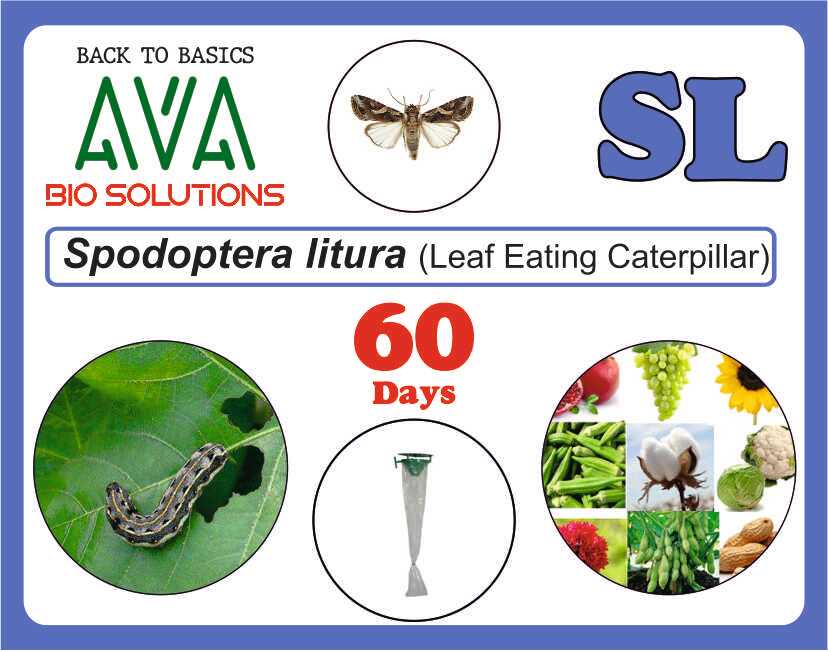Pheromone Lure of Leaf eating Caterpillar
Target Crops: Pomegranate, Soybean, Rose, Cotton, Groundnut, Chilli/Capsicum, Tobacco, Sunflower, Potato, Lucern, Bhendi, Caster, Marigold, Guava, Brinjal etc.
Trap to be used: Funnel Trap Number of traps per Acre: 7 - 8 Life of Lure: 60 Days |
Leaf eating Caterpillar (Spodoptera litura)
Identification
Adult moths measure between 15-20 mm (0.59-0.79 inches) in length and have a wingspan of 30-38 mm (1.18-1.5 inches). Forewings are gray to reddish-brown, with a complex pattern of creamy streaks and paler lines along the veins. Hind wings are grayish-white with grayish-brown margins. Males have a blue-grey band from the upper corner (apex) to the inner margin of each forewing. Larvae have bright yellow stripes along the back and the sides. Larval color varies from pale green to dark green, and then finally brown for the later instars or more mature forms. Brown, mature larvae appear to have three thin yellow, longitudinal lines: one on the top or dorsal side and one each lateral side. A row of black dots runs along each lateral side, and a row of dark triangles decorate each side of the middle, dorsal line.
Life Cycle
Females lay eggs in masses of 200 to 300 eggs that are approximately 4-7 mm (0.16-0.27 inches) in diameter and cream to golden brown in color. Egg masses are usually covered with body hair scales and laid on the underside of the host plant leaf. Eggs usually hatch between three to four days. Young larvae or caterpillars are a translucent green with a dark thorax. They are smooth-skinned with a pattern of red, yellow, and green lines, and with a dark patch on the back of the head (mesothorax). Feeding is initially by skeletonizing, or leaving the outline of the leave veins on the plant. As growth continues, caterpillars eat entire leaves, and even flowers and fruits. The Caterpillar burrows into the soil several centimeters and there pupates without a cocoon. While pupating, it produces large amounts of fluid. Attempts to allow pupation in captivity within an empty glass jar have resulted in drowning. The pupal stage lasts either a few weeks or several months, depending upon time of year. The average life cycle will be completed in about 25 days.
Nature of Damage
On most crops, damage arises from extensive feeding by larvae, leading to complete stripping of the plants. Freshly hatched caterpillars feed gregariously, scrapping the leaves from ventral surface. Greenish caterpillars feed on the leaves voraciously and present an appearance to the field as if grazed by cattle. Since this pest is nocturnal in habit it hides under the plants, cracks and crevices of soil and debris during the day time. Faecal pellets are seen on the leaves and on the ground which is the indicator of the pest incidence.
Adult moths measure between 15-20 mm (0.59-0.79 inches) in length and have a wingspan of 30-38 mm (1.18-1.5 inches). Forewings are gray to reddish-brown, with a complex pattern of creamy streaks and paler lines along the veins. Hind wings are grayish-white with grayish-brown margins. Males have a blue-grey band from the upper corner (apex) to the inner margin of each forewing. Larvae have bright yellow stripes along the back and the sides. Larval color varies from pale green to dark green, and then finally brown for the later instars or more mature forms. Brown, mature larvae appear to have three thin yellow, longitudinal lines: one on the top or dorsal side and one each lateral side. A row of black dots runs along each lateral side, and a row of dark triangles decorate each side of the middle, dorsal line.
Life Cycle
Females lay eggs in masses of 200 to 300 eggs that are approximately 4-7 mm (0.16-0.27 inches) in diameter and cream to golden brown in color. Egg masses are usually covered with body hair scales and laid on the underside of the host plant leaf. Eggs usually hatch between three to four days. Young larvae or caterpillars are a translucent green with a dark thorax. They are smooth-skinned with a pattern of red, yellow, and green lines, and with a dark patch on the back of the head (mesothorax). Feeding is initially by skeletonizing, or leaving the outline of the leave veins on the plant. As growth continues, caterpillars eat entire leaves, and even flowers and fruits. The Caterpillar burrows into the soil several centimeters and there pupates without a cocoon. While pupating, it produces large amounts of fluid. Attempts to allow pupation in captivity within an empty glass jar have resulted in drowning. The pupal stage lasts either a few weeks or several months, depending upon time of year. The average life cycle will be completed in about 25 days.
Nature of Damage
On most crops, damage arises from extensive feeding by larvae, leading to complete stripping of the plants. Freshly hatched caterpillars feed gregariously, scrapping the leaves from ventral surface. Greenish caterpillars feed on the leaves voraciously and present an appearance to the field as if grazed by cattle. Since this pest is nocturnal in habit it hides under the plants, cracks and crevices of soil and debris during the day time. Faecal pellets are seen on the leaves and on the ground which is the indicator of the pest incidence.


